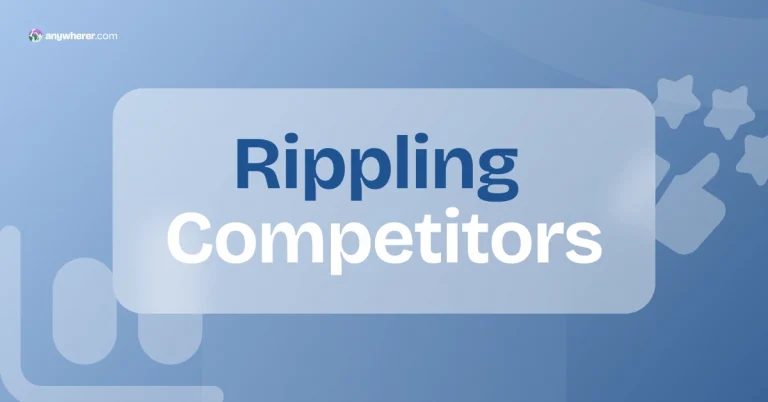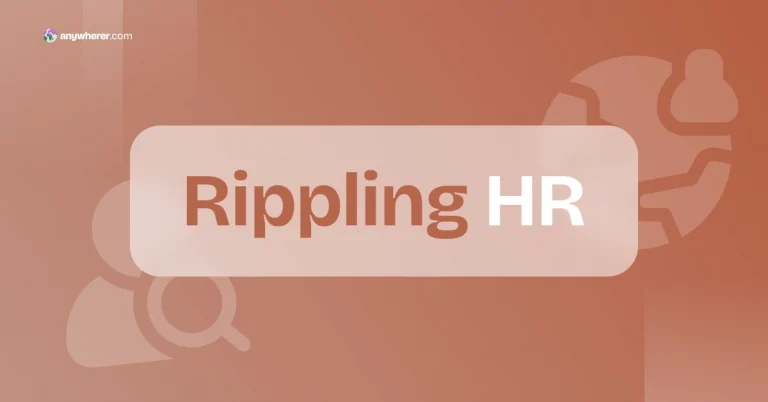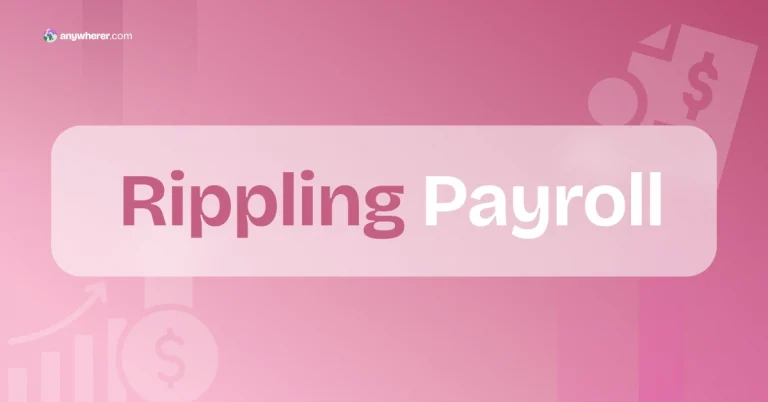The Evolution of Interviews in the Era of Technology and Remote Work
In recent years, the interview process has undergone significant transformations, primarily driven by technological advancements and the increasing adoption of remote work models. This evolution is particularly evident in the tech industry, where IT specialists and software developers have long embraced remote work and virtual interactions.
Increased Adoption of Virtual Interviews
The shift towards virtual interviews has been substantial. A survey by Indeed revealed that 82% of employers utilized virtual interviews, with 93% planning to continue this practice in the future.
Similarly, LinkedIn reported that 81% of hiring teams have adopted virtual recruitment processes using online platforms.
Efficiency and Accessibility
Virtual interviews offer numerous benefits, including reduced time-to-hire and streamlined hiring processes. They eliminate geographical constraints, enabling employers to access a broader talent pool. Candidates also benefit from the convenience of interviewing in familiar environments, which can enhance performance and confidence.
Challenges and Considerations
Despite their advantages, virtual interviews present challenges such as ensuring equitable assessments and managing technical issues. Employers must be vigilant in addressing these concerns to maintain a fair and effective hiring process.
The Rise of Hybrid Work Models
The adoption of hybrid work models has influenced interview processes. A study by Accenture found that 63% of high-growth companies have implemented a “productivity anywhere” hybrid work model. Additionally, 74% of U.S. companies are using or plan to implement a permanent hybrid work model.
How to Interview a Software Engineer Online
The purpose of an interview is to assess a candidate and to that end, you should have some specific goals in mind. Essentially, you want to know if they have the specific skills you need to work on your project and whether or not they will fit in with the rest of your team. Your specific goals will depend on the position the candidate is interviewing for. Part of how to conduct a virtual interview lies in the groundwork you do before the actual interview.
Here are the software engineering interview prep steps to get ready for interviewing candidates:
- Make sure your technical tools are functioning: have your video interview tool in place. You will need to forward the links to whatever tool you are using to the candidates at least 30 minutes before the interview. Test all of your equipment beforehand to ensure everything is working.
- Set up your interview space: make sure that you will be visible to the candidate and that there are no lighting issues. You should also ensure that there will be no distractions or disturbances during the interview. Mute your phone, computer notifications, and anything else that may interrupt the interview.
- Prepare a script: it isn’t necessary to write down everything you want to say word for word but you should at least have an outline to follow. This should include your introductory statement as well as the software developer interview questions that you want to ask the candidate. Questions should be designed to assess soft skills, hard skills, and behavioral intelligence. The interview will include a programming skill assessment test and you should have some problems/tasks prepared in advance.
Once all of your preparations are complete you are ready to start conducting interviews.
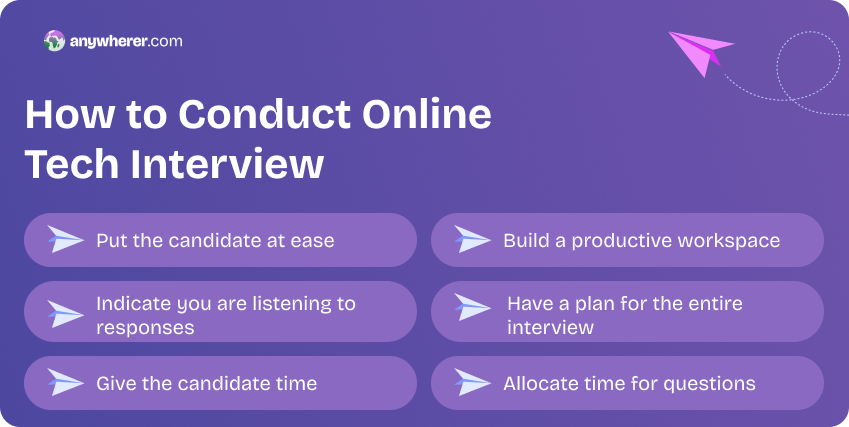
Here is how to conduct a technical interview online:
- Have a plan for the entire interview: you should set a time limit when conducting interviews. It is sometimes easy to get sidetracked. A typical interview with a software developer will be around 1 hour. The first 10 minutes will consist of introductory questions. Another 5 minutes can be spent discussing the candidate’s resume. Allocate 45 minutes for the coding test which is the industry standard. The final 5 minutes are for feedback.
- Put the candidate at ease: most candidates are going to be a little nervous at the beginning of the interview so don’t immediately dive into your questions. Ask them how they are doing and tell them a bit about the company and the position to build some trust and make them more comfortable with the situation before moving on to the questions.
- Indicate you are listening to responses: as the candidate responds to your questions, give some signs you are paying attention to what they say. It can confuse candidates if they see the interviewer sitting motionless with no reaction. They may think there is some sort of technical difficulty that has caused the screen to freeze. Nod occasionally and smile to show that you are listening and to keep them from getting too nervous.
- Give the candidate time: when asking questions give the candidate 3 or 4 seconds to start answering. They may need a second or two to gather their thoughts and think how they will respond to the question. In addition, it is always possible that there is a slight delay in online video streaming. The same goes for when they have finished answering the question. Allow a few seconds before asking the next question to make sure they have finished their answer and to allow for any delay. Some remote interview tips for the question portion are to prepare two-part questions that the interviewee can’t respond to with quick answers so they aren’t able to prepare answers in advance. You should also ask every candidate the same questions so that you can compare applicants using the same parameters.
- Coding test: there are several different tools to administer a coding test online to complete a software engineer skills assessment. GitHub is a popular choice but there are plenty of other options. HackerRank, CoderPad, CodeInterview, Codility and Type12 are a few of the coding interview and assessment tools employers can use. Some virtual interviewing strategies and tips for the coding portion of the interview include:
– Be open to more than one solution: a problem may have an obvious answer but don’t discount a developer just because they solved it in a different way. It can be a sign that they are adept at critical thinking.
– Let applicants make mistakes: don’t stop an applicant if you see them making a mistake. Letting them work through a problem will give you an indication of how they will react to issues on the job.
The final step of the interview process is evaluating candidates:
- Look at the candidates’ ability to talk about the steps they took during the coding test and how they reacted to criticism.
- Discuss the applicant’s plans and career goals.
- Determine in your mind whether the candidate can write code, communicate, and work well with your team.
- Make the final decision with the assistance of the existing software development team.
Here are a few more virtual interview tips for employers to help choose the right applicants:
- Ask questions that have the most relevance to the work or the skills you are trying to evaluate. This will enable you to more quickly determine if the applicant is suitable.
- Define which of the candidate’s skills you are most interested in. Is it a specific programming language or certain traits? You have to know what you are looking for to find the best candidates.
- Select the best candidate’s resumes. You will be able to quickly narrow the field of candidates so you don’t spend time interviewing those who don’t have the experience or specific skills for the position.
When conducting a virtual interview, it’s important to assess a candidate’s ability to work in a globally distributed team. Businesses often use Employer of Record (EOR) solutions, and exploring Deel competitors can help find the best fit for hiring needs. Additionally, if the role involves outsourced IT services, understanding what is ITES can provide clarity on industry-specific skills required for success.
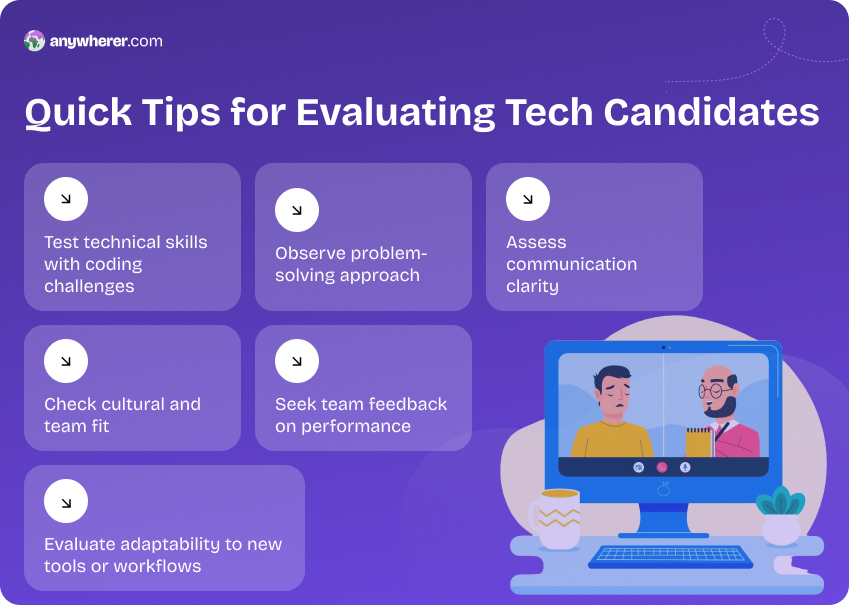
Sample Questions for Software Developers
Interview questions for remote workers are designed to allow a company to assess a candidate’s skills and to try and get an idea of how they will react in different situations. Questions will generally fall into 2 broad categories: soft skills and behavioral questions and hard skills questions. One of the best practices for interviewing engineers is to ask behavioral and soft skill questions to identify competencies like initiative, self-management and leadership.
A common first question is the “Tell me about yourself web developer” question. This is a question most candidates will be prepared for and gives them a chance to provide a summary of their career and how it has prepared them for the position they are applying for. It serves as an icebreaker and can set the tone of an interview.
Here are some other remote interview questions for software developers:
- Soft skill interview questions: soft skill interview questions allow you to learn about a candidate’s personality traits that can affect their work. Popular soft skill questions include:
- “Tell me about a time when you were asked to do something you had never done before. How did you react? What did you learn?” . Helps identify adaptability.
- “Give an example of when you had to work with someone hard to get along with. How did you handle interactions with that person?”. Helps to identify collaboration skills.
- “Describe the traits your ideal product team would have”. Helps to identify what traits the candidate values.
It is common for software developers to work remotely these days. Often a company would like to know how a candidate would do working on their own.
Here are a few examples of the ability to work independently on interview questions you might ask:
- Do you prefer working alone or in a group?
- Tell us about some projects or ideas that were implemented or carried out successfully because of your efforts.
- Describe a work situation where it was not clear how a project was to be addressed, and you had to figure it out on your own.
- Describe your experience working remotely.
A new hire will have to know how to engage remote employees who are members of the same team. During the interview, you will want to consider asking some team-building questions for remote workers to determine if the candidate will fit well into your team.
The following are examples of teamwork interview questions:
- Describe a time when a project you were working on had problems due to a lack of teamwork. How did you handle the situation?
- Tell us about a time when you worked well as part of a team.
- If a member of your team was disengaged what would you do to motivate them?
- If you and another team member disagree about how a group project should proceed, how do you come to a decision?
Hard-skill interview questions will often depend on the particular position being filled and the skill set you are looking for. However, there are some general questions you can ask that will give you some insight into a developer’s hard skills.
A few hard skills questions:
- What quality assurance process do you use for writing code and how do you identify a bug in an application?
- How do you organize your coding workflow?
- What is agile software development and what are your thoughts on it?
Whether you are hiring IT contractors or in-house employees, the interview process is critical to making the right choice for your team. By asking relevant questions that focus on the traits you are looking for in team members and doing a thorough assessment of skills, you will improve your chances of finding a competent developer who is a good fit for your team.
FAQs: Navigating Virtual Interviews with Confidence
What are the key tools needed for conducting a virtual interview?
You’ll need a reliable video conferencing platform (e.g., Zoom, Microsoft Teams), a stable internet connection, a good quality microphone and camera, and a quiet, professional environment to ensure effective communication.
How can I assess a candidate’s technical skills during a virtual interview?
Incorporate skill-based assessments or live problem-solving tasks. Use tools like code collaboration platforms for developers or role-specific tools (e.g., writing samples for content roles) to evaluate their abilities.
How do I ensure a seamless virtual interview experience for both parties?
Prepare in advance by testing your technology, sharing meeting links early, and setting a clear agenda. Create a welcoming atmosphere by introducing yourself and briefly explaining the interview process.
What should I look for in a candidate’s body language during a virtual interview?
Pay attention to eye contact (looking into the camera), posture, and facial expressions. Positive body language indicates engagement, confidence, and attentiveness, even in a virtual setting.
How can I evaluate cultural fit through a virtual interview?
Ask open-ended questions about the candidate’s work values, preferred work environment, and how they handle team collaboration. Discuss your company’s culture and observe how the candidate responds to gauge alignment.
What are some red flags to watch for during a virtual interview?
Some red flags in a virtual interview include frequent distractions or background noise, poor communication skills, lack of preparation, inconsistent answers, disinterest in the role or company, and technical issues the candidate didn’t attempt to resolve in advance.
To find the best developers for your team, make sure your preparations are comprehensive so that you can conduct a successful virtual interview!
Marharyta is a seasoned marketing expert with a rich background in supporting dedicated development teams and a keen understanding of the nuances of global remote employment solutions. With a solid track record of executing impactful campaigns, crafting strategic marketing plans, and delivering high-quality content, Marharyta plays a key role in establishing Anywherer as a reliable source in the EOR and international workforce management industry.

